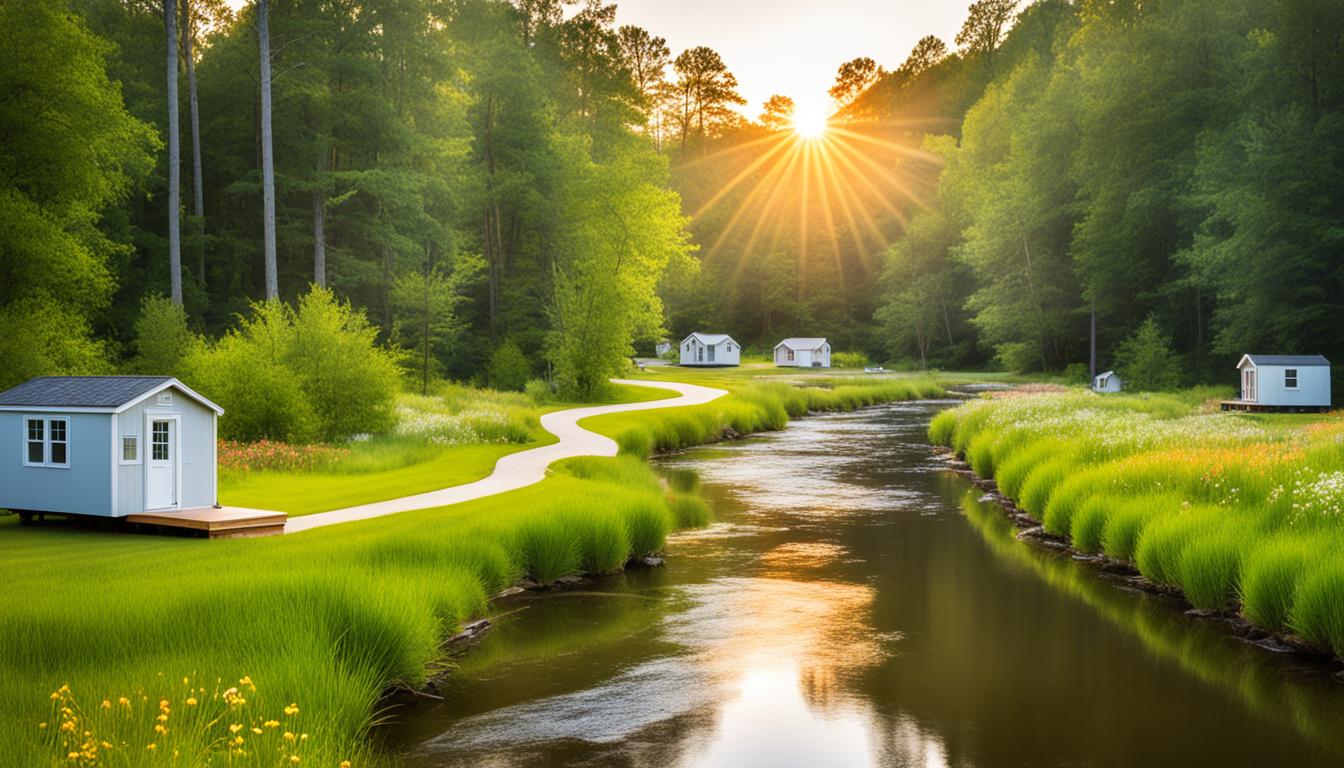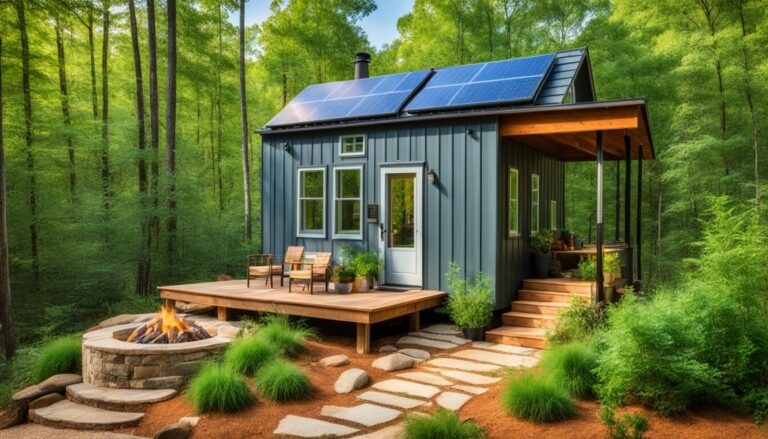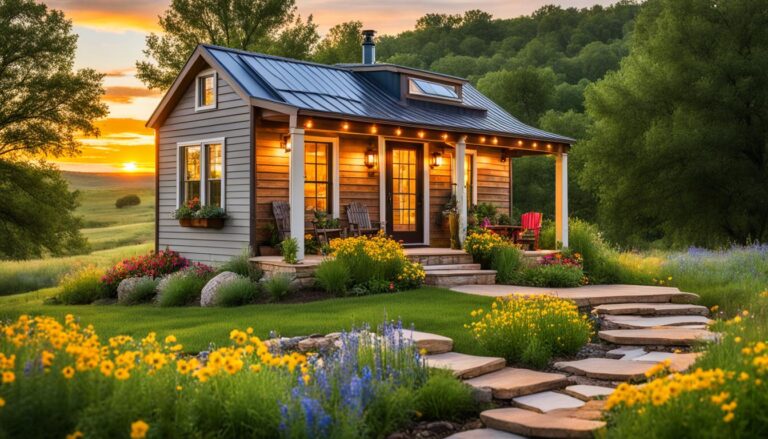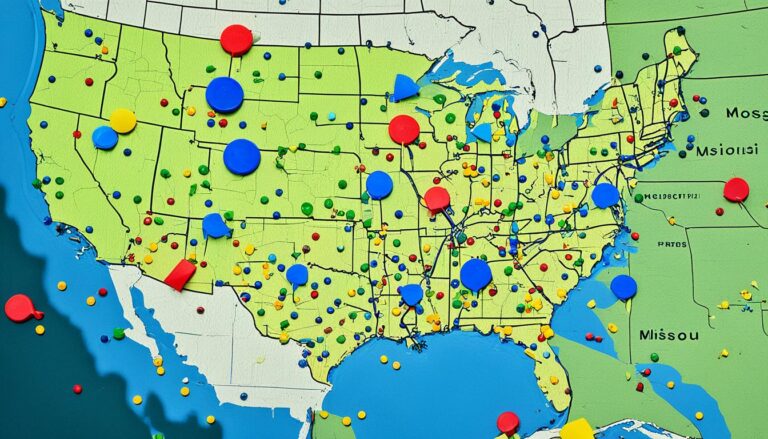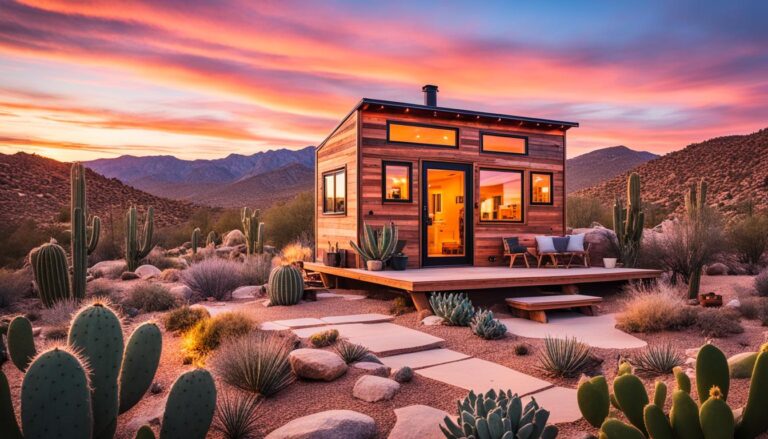Tiny House Placements in Mississippi: Guide
Are you considering a tiny house lifestyle in Mississippi but unsure about where you can legally park and live? Mississippi currently has no specific regulations governing tiny houses, which can make it challenging to navigate the legalities of placement. Understanding local zoning laws and regulations is crucial to avoid fines and penalties. In this guide, we’ll explore the placement options, regulations, and tiny house-friendly locations in Mississippi.
Key Takeaways:
- Mississippi has no statewide regulations specifically for tiny houses
- Approval from zoning boards may be required, depending on the location
- Counties such as Jackson, Biloxi, Hattiesburg, and Vicksburg are known to be more welcoming to tiny homes
- Tiny houses on wheels (THOWs) may be categorized as recreational vehicles (RVs) and allowed as short-term residences
- Tiny houses on permanent foundations (ADUs) can be built on properties with existing homes
Are Tiny Houses Legal in Mississippi?
When it comes to tiny houses, Mississippi does not currently have any official regulations that specifically address them. While this may provide some freedom to tiny house owners, it also means there is a lack of uniform rules regarding their legality. The state did utilize tiny homes as emergency shelters after Hurricane Katrina, but there has been no official recognition of tiny homes since then.
It’s important to note that even though there are no specific regulations, building restrictions may still apply at the municipal or state level. These restrictions can include minimum square footage requirements, the number of exits, and the distance a tiny house must be from lot lines. Therefore, it is crucial for individuals interested in residing in a tiny house to research and understand the local building codes and zoning regulations to ensure compliance.
While the absence of specific regulations offers flexibility, it is essential to consult with local authorities and zoning offices to determine the legality of placing a tiny house in Mississippi.
Types of Tiny Houses Permitted in Mississippi
While there are no statewide regulations for tiny houses in Mississippi, certain types may be permitted in specific locations. Let’s take a closer look at the different types of tiny houses that may be allowed in the state:
Tiny Houses on Wheels (THOWs)
Tiny houses on wheels, or THOWs, are often categorized as recreational vehicles (RVs) and may be allowed as short-term residences. These portable homes offer flexibility and mobility, giving homeowners the freedom to travel or relocate as desired. However, it’s important to check with local zoning authorities to determine any restrictions or requirements for parking and living in a THOW in Mississippi.
Tiny Houses on Permanent Foundations (ADUs)
Tiny houses on permanent foundations, also known as accessory dwelling units (ADUs), can be built on properties with existing homes. These ADUs are often used as secondary living spaces or in-law suites. They offer a more traditional housing option while still providing the benefits of compact living. Just like with any other construction project, it’s crucial to comply with local building codes and obtain necessary permits when building an ADU in Mississippi.
Tiny Houses as Manufactured Homes
Tiny houses can also be classified as manufactured homes. These homes are built off-site in a factory and transported to their final location. They are subject to zoning regulations and may be restricted to certain zones in Mississippi, such as agricultural or residential areas. It’s important to consult with local authorities to understand the specific regulations and requirements for placing a manufactured tiny house in your desired location.
While these are the general types of tiny houses that may be permitted in Mississippi, it’s essential to conduct thorough research and consult with local zoning offices to determine the specific rules and regulations that apply to tiny house placement in your area.
Tiny House Building Codes in Mississippi
When building a tiny house in Mississippi, it is essential to understand the building codes that apply to ensure compliance with safety and habitability regulations. While there are no specific statewide regulations for tiny houses, Mississippi requires counties to adopt one of the universal building codes for construction. One of the most commonly used codes is the International Residential Code (IRC).
The building codes cover various aspects of construction, including accessibility, structural soundness, fire safety, electrical systems, and plumbing. These codes help ensure that the tiny house is built to high standards and provides a safe living environment.
However, it is important to note that each county has the flexibility to choose whether or not they follow the universal building codes. Some counties may still rely on older versions of the IRC or have their own specific regulations. Therefore, it is crucial for tiny house builders to thoroughly research and understand the building codes that apply in their specific county.
By adhering to the building codes, tiny house builders can ensure that their structures meet the necessary standards for safety, durability, and habitability. Complying with these codes also helps facilitate the process of obtaining permits and approvals from local authorities.
Benefits of Building to Code
Building a tiny house to code in Mississippi offers several advantages. First, it provides peace of mind, knowing that the structure is safe and secure. Furthermore, building to code increases the likelihood of obtaining financing for the project and may also make it easier to obtain insurance coverage.
Another advantage of building to code is that it can help prevent issues during the inspection process and potential complications when applying for permits. By ensuring compliance with the applicable building codes, tiny house builders can streamline the building process and minimize delays or setbacks.
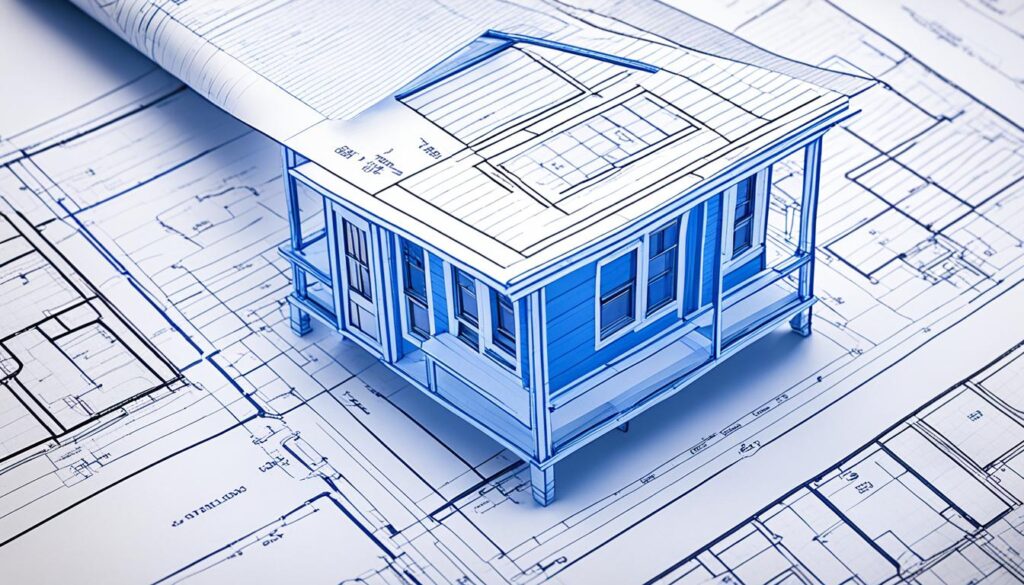
Overall, understanding and following the building codes in Mississippi is essential for anyone planning to build a tiny house. It is recommended to consult with local authorities or building officials to receive specific guidance and clarification on the building codes that apply in your county.
Tiny House-Friendly Counties in Mississippi
When it comes to tiny house living in Mississippi, some cities and counties are more welcoming to these alternative dwellings. If you’re considering placing a tiny house in Mississippi, it’s important to research the local regulations and requirements before making any commitments.
Here are some of the Mississippi counties known for being tiny house-friendly:
- Southaven
- Jackson
- Vicksburg
- Biloxi
- Meridian
- Hattiesburg
- Gulfport
- Tupelo
While these cities have shown more openness towards tiny houses, it’s crucial to check with local zoning offices to determine the specific regulations and requirements in each area. Zoning laws can vary from one city to another, so it’s important to understand the rules before moving forward with your tiny house plans.
Whether you’re looking for a sense of community or a peaceful getaway, Mississippi offers various options for tiny house living. From established tiny house communities to privately-owned properties, there are solutions to suit different preferences and needs.
Tiny House Communities and Parking Options in Mississippi
Mississippi offers a variety of options for those interested in tiny house living. One popular choice is to join one of the many tiny house communities in Mississippi. These communities provide a unique sense of belonging and a chance to connect with like-minded individuals who share similar values and lifestyles. Living in a tiny house community fosters a sense of camaraderie and support, as residents can bond over their shared experiences and challenges.
For individuals who prefer more flexibility and freedom in their tiny house journey, there are various parking options for tiny houses in Mississippi. Tiny houses can be parked in RV parks, where they can enjoy amenities such as water, electricity, and sewage hookups. National parks and campgrounds provide an opportunity to enjoy nature while living in a tiny house. Private properties offer a more secluded and personal setting, allowing homeowners to customize their living space according to their preferences. Additionally, there are transitional housing options available for those who are exploring tiny house living before committing to building or purchasing their own.
“Living in a tiny house community provides a supportive and like-minded community for individuals who value a simpler lifestyle and sustainability.”
If you’re interested in experiencing the tiny house lifestyle firsthand, Longleaf Piney Resort is a great option. They offer tiny houses for rent, allowing individuals to test out the tiny house lifestyle before making a long-term commitment. This gives you the opportunity to see if tiny house living aligns with your needs and preferences.
Whether you choose to join a tiny house community or explore different parking options, there are plenty of opportunities to make your tiny house dreams a reality in Mississippi.
Buying a Tiny House in Mississippi
If you’re considering buying a tiny house in Mississippi, it’s important to work with a licensed builder who can ensure compliance with building codes and regulations. Great Lakes Tiny Homes is a certified builder approved by the RV Industry Association (RVIA) and adheres to strict safety and construction standards. Working with a certified builder not only ensures the quality of materials and construction but also provides access to financing and insurance options.
“We take pride in our craftsmanship and commitment to delivering top-notch tiny homes to our clients,” says John Smith, owner of Great Lakes Tiny Homes. “Our team of experienced builders and designers will work closely with you to create the perfect tiny house that meets your needs and exceeds your expectations.”
By choosing a licensed builder like Great Lakes Tiny Homes, you can have peace of mind knowing that your investment is in good hands. Their expertise in tiny house construction, knowledge of local regulations, and dedication to customer satisfaction make them a reliable choice for anyone looking to buy a tiny house in Mississippi.
When working with a licensed builder, you can expect a seamless buying process. They will guide you through every step, from design and customization to delivery and installation. Whether you’re dreaming of a rustic cabin-style tiny home or a sleek modern design, a licensed builder can bring your vision to life.
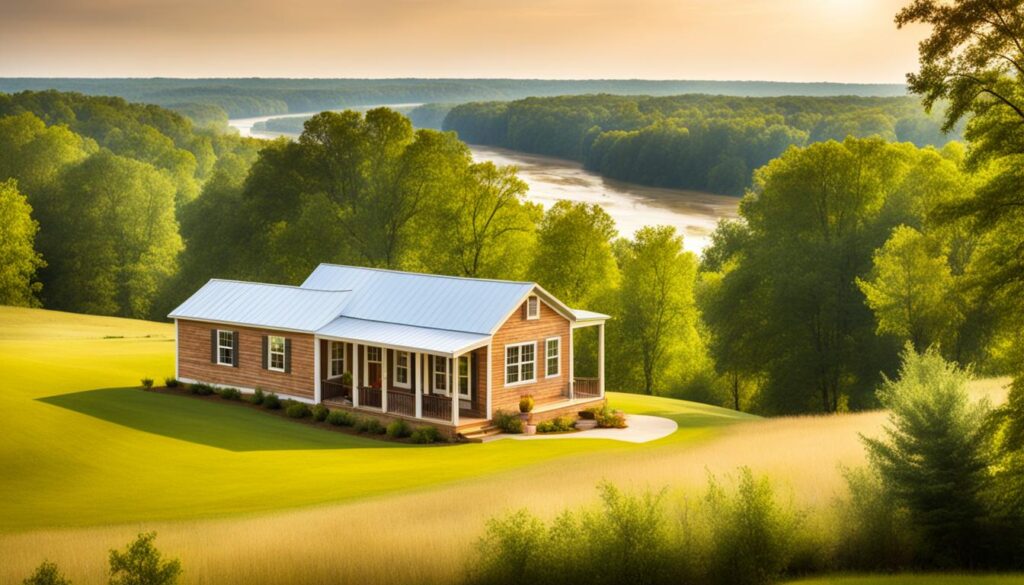
Additionally, licensed builders often have established relationships with suppliers and subcontractors, ensuring that your tiny house is constructed with high-quality materials and completed in a timely manner. This can save you both time and money in the long run.
Buying a tiny house is an investment, and working with a licensed builder provides added protection and support. They understand the unique challenges and considerations of tiny house construction, and their expertise can help you avoid costly mistakes. Whether you plan to use your tiny house as a permanent residence, a vacation home, or an investment property, partnering with a licensed builder is the key to a successful and stress-free buying experience.
Before making a decision, it’s always a good idea to research different licensed builders in Mississippi and schedule consultations to discuss your needs and budget. Licensing ensures that builders have met specific requirements, adhere to building codes, and maintain certain standards of professionalism and quality.
If you’re ready to embark on your journey to tiny house living in Mississippi, reach out to a licensed builder like Great Lakes Tiny Homes. They will guide you through the process, answer your questions, and help you find the perfect tiny house that meets your unique needs and preferences.
Now that you know the importance of working with a licensed builder, you can confidently take the next steps towards buying a tiny house in Mississippi. Embrace the freedom, simplicity, and sustainability of tiny house living with the guidance and expertise of a trusted builder.
Take the first step towards your dream home by contacting Great Lakes Tiny Homes today.
Sources: WLBT: 60-unit Tiny House Village to be Built for Jackson’s Homeless
Living in a Tiny House in Mississippi
Living in a tiny house in Mississippi offers a unique and minimalist lifestyle that many individuals find appealing. While Mississippi does not have specific statewide regulations for tiny houses, it is still possible to make a permanent residence in a tiny house. However, it is important to consider the classification of your tiny house, as well as the building laws and regulations that may apply.
If you plan to have a tiny house on a permanent foundation, it must comply with the International Residential Code (IRC) and other safety and compliance requirements. This ensures that your tiny house meets the necessary standards for permanent habitation, offering you a comfortable and secure living space.
Living in a tiny house allows you to embrace a more sustainable and affordable lifestyle. It encourages you to downsize and prioritize experiences over material possessions. Plus, with the right design and organization, you can still enjoy all the comforts of a traditional home within your tiny living space.
When it comes to property taxes for tiny houses in Mississippi, it’s essential to understand that the taxation may vary depending on the classification of your tiny house. Local authorities assess the value of the property, which includes the tiny house and the underlying land. It is advisable to consult with local tax offices to determine the specific property tax requirements for your tiny house.
Recent news has highlighted the struggles faced by the homeless population in Jackson, Mississippi. Tiny houses, with their potential for affordability and compact size, could potentially offer a solution to the housing crisis in the state.
Living in a tiny house in Mississippi allows individuals to pursue a simpler and more sustainable lifestyle, while also contributing to the community by freeing up resources and promoting affordable housing solutions.
Conclusion
While Mississippi lacks specific statewide regulations for tiny houses, there are ample opportunities for tiny house living in certain cities and counties. It is essential to conduct thorough research and adhere to local zoning regulations, building codes, and safety requirements as they may vary depending on the location. Consulting with local authorities and working with a certified builder, such as Great Lakes Tiny Homes, can ensure a successful and legal placement of a tiny house in Mississippi.
Understanding the nuances of tiny house placement in Mississippi is crucial to avoid fines and penalties. By collaborating with local zoning offices and referring to the Mississippi Disaster Housing Task Force, individuals can gain valuable insights into placement options and regulations specific to their area.
To learn more about Mississippi’s regulations and resources for tiny house placement, visit the Mississippi Disaster Housing Task Force. By staying informed and following the appropriate guidelines, individuals can embark on the rewarding journey of tiny house living in Mississippi.

